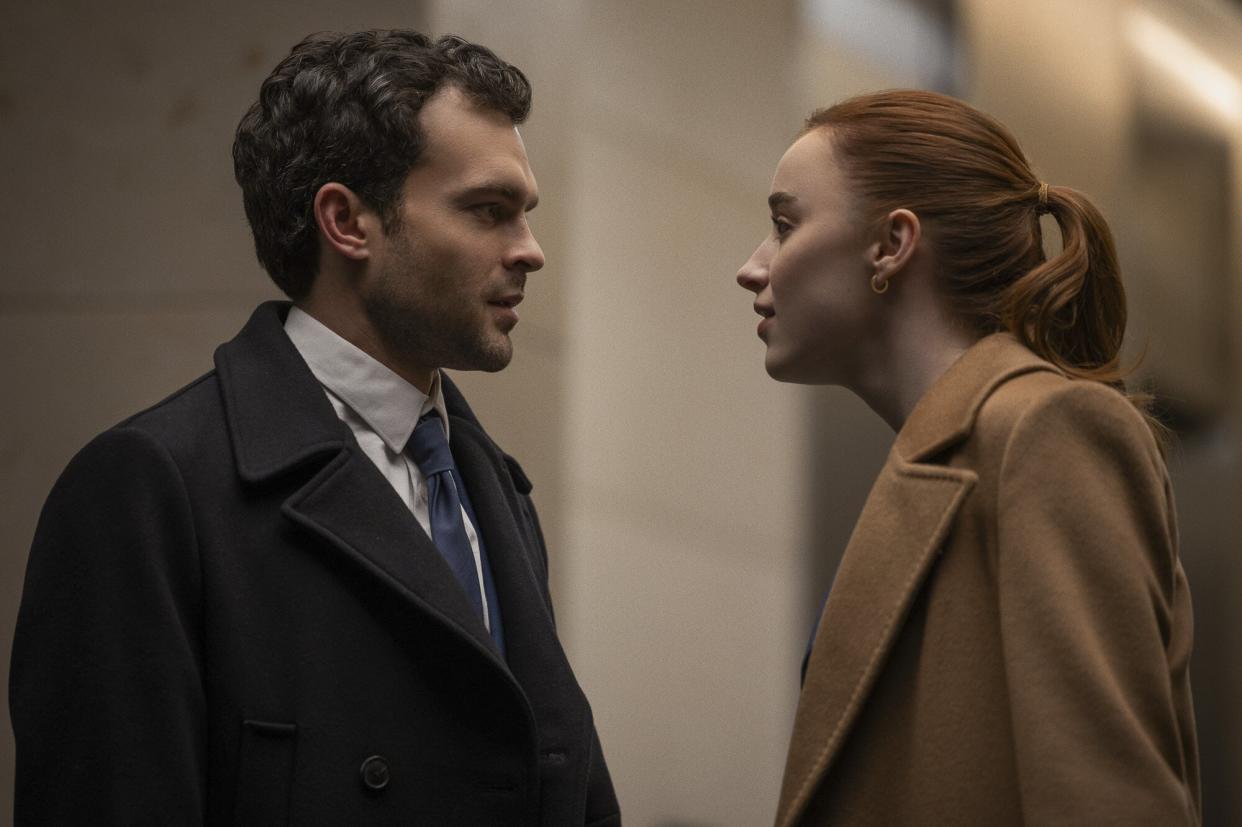“Fair Play” director breaks down that shocking ending

- Oops!Something went wrong.Please try again later.
Warning: This article contains spoilers from Fair Play.
Who won? Who's right?
Those are the questions Fair Play (streaming now on Netflix) leaves the audience with at its conclusion, following financial analysts Emily (Phoebe Dynevor) and Luke (Alden Ehrenreich) through the implosion of their secret romantic relationship.
Writer-director Chloe Domont makes her feature debut with the twisty, intense tale of a vicious, toxic cycle. It begins with Emily's promotion, which threatens Luke's fragile ego. At first, he appears entirely in the wrong. Domont intended it that way and says she initially pitched the film even more firmly on Emily's side.
"When I first wrote the script, it was much more one-sided toward Emily," she tells EW. "But as I started to rewrite, and when I cast Alden and we had discussions and started to rehearse, I realized that the much more interesting version of the film was a little bit more gray, one that does go back and forth up until a certain point."
Things go increasingly off the rails when Luke's dealings land Emily in hot water with the boss. She lies to their manager, Campbell (Eddie Marsan), about their relationship, claiming Luke has been stalking her. Unaware of their simmering loathing, Emily and Luke's parents throw the couple an engagement party, which ends brutally with Luke raping Emily in the bathroom. "I always knew I wanted to create this ballooning tension that, when it does pop, it turns into a dogfight," Domont explains. "All hell breaks loose." For the filmmaker, that rape unequivocally pitches the film to Emily, adding, "There is a clear line drawn in the sand at a certain point in that bathroom scene."

Sergej Radovic / Courtesy of Netflix Alden Ehrenreich and Phoebe Dynevor in 'Fair Play'
The violence of Luke's actions propel Emily to the film's disturbing conclusion where she holds Luke at knifepoint and forces him to say out loud that he is nothing. "The way that Emily holds him accountable is in a brutal, ugly way," Domont notes. "But Luke is the first one to reclaim that power through physical force and physical abuse that opens a whole can of ugliness. Emily tries to use her words in that final scene to confront him, but this is a man who refuses to be held accountable on any single level. If she wants to hold him accountable, she's going to have to use the same physical force that he used against her."
Ultimately, the scene isn't about revenge, Domont points out. "It's about getting this man to own up to his inferiority, because his inability to face that causes so much destruction in the film for both her and himself," she says. "This isn't really a film about female empowerment. This is a film about male fragility. The whole film builds up to that last line where she forces him to finally acknowledge that he's nothing."
Domont's biggest goal with writing Fair Play was to be bold and acknowledge that this power dynamic in relationships is something we all experience, even if it's in much more subtle ways than the context of the movie. Her hope now is that the provocative conclusion will get audiences talking enough to confront the ways that dynamic can be destructive.
"We're all afraid to talk about it, because the male ego feels like something that is off limits," the director concludes. "Women are taught to walk on eggshells trying to protect it. The reason why I made this film is because I had been experiencing these situations over and over again in relationships, and it was never anything that we could talk about. It got to a place that felt untenable for me emotionally, because if you don't talk about it, you normalize it. And when you normalize it, it creates this poison not only in your own body, but in the relationship and that bond."
Want more movie news? Sign up for Entertainment Weekly's free newsletter to get the latest trailers, celebrity interviews, film reviews, and more.
Related content:

